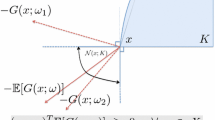Abstract
This paper considers a class of two-stage stochastic linear variational inequality problems whose first stage problems are stochastic linear box-constrained variational inequality problems and second stage problems are stochastic linear complementary problems having a unique solution. We first give conditions for the existence of solutions to both the original problem and its perturbed problems. Next we derive quantitative stability assertions of this two-stage stochastic problem under total variation metrics via the corresponding residual function. Moreover, we study the discrete approximation problem. The convergence and the exponential rate of convergence of optimal solution sets are obtained under moderate assumptions respectively. Finally, through solving a non-cooperative game in which each player’s problem is a parameterized two-stage stochastic program, we numerically illustrate our theoretical results.

Similar content being viewed by others
References
Chen, X., Pong, T.K., Wets, R.J.: Two-stage stochastic variational inequalities: an ERM-solution procedure. Math. Program. 165, 71–111 (2017)
Chen, X., Shapiro, A., Sun, H.: Convergence analysis of sample average approximation of two-state stochastic generalized equations. SIAM J. Optim. 29, 135–161 (2019)
Chen, X., Sun, H., Xu, H.: Discrete approximation of two-stage stochastic and distributionally robust linear complementarity problems. Math. Program. 177, 255–289 (2019)
Chen, X., Xiang, S.: Newton iterations in implicit time-stepping scheme for differential linear complementarity systems. Math. Program. 138, 579–606 (2013)
Chen, X., Ye, Y.: On homotopy-smoothing methods for box-constrained variational inequalities. SIAM J. Control Optim. 37, 589–616 (1999)
Cottle, R.W., Pang, J.S., Stone, R.E.: The Linear Complementarity Problem. SIAM, Philadelphia (2009)
Facchinei, F., Pang, J.S.: Finite-Dimensional Variational Inequalities and Complementarity Problems. Springer, New York (2003)
King, A.J., Rockafellar, R.T.: Sensitivity analysis for nonsmooth generalized equations. Math. Program. 55, 193–212 (1992)
Lei, J., Shanbhag, U.V., Pang, J.S., Sen, S.: On synchronous, asynchronous, and randomized best-response schemes for computing equilibria in stochastic nash games. Math. Oper. Res. 45, 157–190 (2020)
Luo, Z.Q., Pang, J.S., Ralph, D.: Mathematical Programs with Equilibrium Constraints. Cambridge University Press, Cambridge (1996)
Pang, J.S., Sen, S., Shanbhag, U.V.: Two-stage non-cooperative games with risk-averse players. Math. Program. 165, 235–290 (2017)
Rachev, S.T., Klebanov, L., Stoyanov, S.V., Fabozzi, F.: The Methods of Distances in the Theory of Probability and Statistics. Springer, New York (2013)
Ravat, U., Shanbhag, U.V.: On the characterization of solution sets of smooth and nonsmooth convex stochastic nash games. SIAM J. Optim. 21, 1168–1199 (2011)
Ravat, U., Shanbhag, U.V.: On the existence of solutions to stochastic quasi-variational inequality and complementarity problems. Math. Program. 165, 291–330 (2017)
Robinson, S.M.: Generalized equations and their solutions, part I: Basic theory. In: Huard, P. (ed.) Point-to-Set Maps and Mathematical Programming, pp. 128–141. Springer, Berlin (1979)
Robinson, S.M.: Strongly regular generalized equations. Math. Oper. Res. 5, 43–62 (1980)
Rockafellar, R.T., Sun, J.: Solving monotone stochastic variational inequalities and complementarity problems by progressive hedging. Math. Program. 174, 453–471 (2019)
Rockafellar, R.T., Wets, R.J.: Scenarios and policy aggregation in optimization under uncertainty. Math. Oper. Res. 16, 119–147 (1991)
Rockafellar, R.T., Wets, R.J.: Variational Analysis. Springer, Berlin (2009)
Rockafellar, R.T., Wets, R.J.: Stochastic variational inequalities: single-stage to multistage. Math. Program. 165, 331–360 (2016)
Römisch, W.: Stability of stochastic programming problems. Handb. Oper. Res. Manag. Sci. 10, 483–554 (2003)
Shapiro, A.: Monte Carlo sampling methods. Handb. Oper. Res. Manag. Sci. 10, 353–425 (2003)
Shapiro, A., Dentcheva, D., Ruszczyński, A.: Lectures on Stochastic Programming: Modeling and Theory. SIAM, Philadelphia (2014)
Shapiro, A., Xu, H.: Stochastic mathematical programs with equilibrium constraints, modelling and sample average approximation. Optimization 57, 395–418 (2008)
Zhang, J., Xu, H., Zhang, L.: Quantitative stability analysis for distributionally robust optimization with moment constraints. SIAM J. Optim. 26, 1855–1882 (2016)
Acknowledgements
The authors thank Dr. Hailin Sun for his help in the numerical experiment. They would like to thank the editor and three anonymous referees for their insightful comments which help us to improve the content and presentation of this manuscript.
Funding
Xiaojun Chen’s work was partially supported by Hong Kong Research Grant Council Grant PolyU153000/17P. Zhiping Chen’s work was partially supported by the National Natural Science Foundation of China Nos. 11991023, 11991020, 11735011.
Author information
Authors and Affiliations
Corresponding author
Additional information
Publisher's Note
Springer Nature remains neutral with regard to jurisdictional claims in published maps and institutional affiliations.
Rights and permissions
About this article
Cite this article
Jiang, J., Chen, X. & Chen, Z. Quantitative analysis for a class of two-stage stochastic linear variational inequality problems. Comput Optim Appl 76, 431–460 (2020). https://doi.org/10.1007/s10589-020-00185-z
Received:
Published:
Issue Date:
DOI: https://doi.org/10.1007/s10589-020-00185-z




